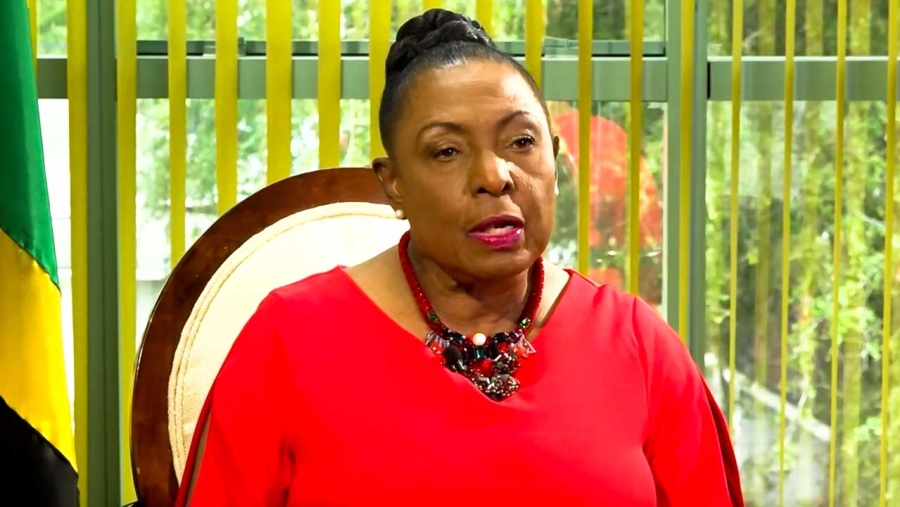Doing right by the ancestors
by Olivia Grange
This is the second year that we have called the nation to observe March 25 as the National Day of Remembrance of the Victims of Chattel Enslavement and the Transatlantic Trafficking in Africans. It is part of my mission to do the right things for culture, gender, entertainment and sport.
We, the members of the Jamaican family, come from very good stock. Our people have done well in all spheres, but too few of us know about what our people have done and our origins. As Minister, I am resolved to changing that.
By declaring March 25 as the day of remembrance, we hope to set things right by the memory of and in the name of the ancestors, many of whom suffered and died so that we could live in freedom. On this day, we recall that the ancestors were captured in Africa, separated from their families and cultures, and brought to Jamaica, shackled and tortured, where they endured four hundred years of constant dehumanising suffering. But we also remember their refusal to accept the status quo, their constant resistance, and the many brave battles they fought which culminated in them winning the centuries-old war for our liberty.
Today, I reflect on how different our lives would be had it not been for the ancestors who managed to extract themselves from victimhood into being victors over other humans who sought to oppress and devalue them. I consider that everything that we have become is due to the sacrifice of our ancestors.
They cleared the field. We have the responsibility, in the words of Bustamante, “to build a Jamaica which will last and of which we and the generations to follow may be proud.” It should also be a country in which we promote and create rituals that tell the authentic Jamaican story. Rituals and memorialisation of important events will help to shape a nation of people that know who they are, proud of what our people have achieved, and inspired to do their part in the continuous process of building a better, stronger and more prosperous Jamaica.
In this we must become a people who demonstrate appreciation for the sacrifices of the ancestors, the legacy we inherited from their bold and relentless efforts and commit ourselves to play our own part in enshrining these rights, freedoms and identities we now embrace on account of the glorious history of our ancestors.
We must also set right the great wrong that was done by the colonisers to our ancestors. In tribute to the ancestors, we must continue to pursue reparations for the hundreds of years of chattel enslavement on plantations in this country. It is not enough that the enslavers and their descendants should regret the suffering that slavery inflicted on our ancestors. When you have done something wrong, you must take responsibility for it, apologise and try to set things right. That is really the essence of our demand.
Despite great effort and major strides towards building a prosperous nation, we are aware that plantation economy caused severe underdevelopment in Jamaica and, as such, has affected our country’s advancement. We are also aware that the high level of aggression in our society is linked to the fact that the whole practice of enslavement was built on violence and positioning us against each other. We see clearly the legacy of chattel enslavement, and our demand for reparations is really about repairing the damage which is still evident today.
In this regard, my Ministry of Culture, Gender, Entertainment and Sport through our National Council on Reparation is in the process of creating a Policy and Roadmap for Reparatory Justice. In this process, we are consulting with other ministries, agencies, sectors, communities and civil society. Today, I invite all Jamaicans, as a tribute to the ancestors, to join with us as we engage in Reparatory Justice towards addressing the problem of poverty as a pervasive element which we have faced through centuries of neglect and deliberate impoverishment by the enslavers and colonisers.
I can scarcely imagine how the ancestors endured the most horrific and egregious forms of one people’s inhumanity against another. Yet, they did not accept their victimhood. Indeed, their stories are litanies of resistance as they fought endlessly so that we, their descendants, would not be enslaved but, rather, that we would be free to live a life of freedom and promise. Theirs was the daily motivation to live one more day so that the European enslavers and colonisers would not win the battle for their souls.
Today, we come strengthened by their fierce determination and resilience. We come celebrating our rights and freedoms, secured for us through their tireless struggles and ultimate victory. We come mindful that the struggles we face today in our desire to promote prosperity for all can be overcome if we work together with one heart and one love. Today, we pay maximum respect to the ancestors, determined that as they did, we will ensure that our children will inherit even greater than what we inherited.
Olivia Grange is the Minister of Culture, Gender, Entertainment and Sport
 Government of Jamaica
Government of Jamaica
